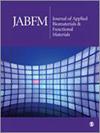Vanillin loaded-physically crosslinked PVA/chitosan/itaconic membranes for topical wound healing applications
IF 3.1
4区 医学
Q2 BIOPHYSICS
Journal of Applied Biomaterials & Functional Materials
Pub Date : 2024-09-19
DOI:10.1177/22808000241281273
引用次数: 0
Abstract
Vanillin loaded-physically crosslinked hydrogel membranes made of PVA/chitosan/itaconic acid (PVA-CS-IA) were prepared using freezing-thawing (F-T) cycle method. To ensure the entanglement of PVA-CS-IA chains, three F-T cycles were repeated. The polymeric chains entanglements were confirmed and characterized by different instrumental characterizations. Physicochemical properties for example, swelling ratio, mechanical characteristics, gel fraction percentage (GF%), hydrolytic degradation, and thermal stability of PVA-CS-IA membrane were discussed in detail. The findings showed that the swelling ratio, mechanical characteristics, and hydrolytic degradation of the crosslinked membranes enhanced with increasing CS-IA contents in membranes composition; however, GF% gradually declined with CS-IA content. Additionally, cell viability test using HFB-4 cell line and antimicrobial activity against Staphylococcus aureus and Escherichia coli were evaluated using MTT assay and the bacterium growth inhibition percentage method; respectively. Notably, with varying incubation durations and membrane concentrations, all examined constructed hydrogels showed significant cell survival percentages. The findings supported the notion that produced hydrogel membranes might be used in a professional setting as antibacterial dressings or biomaterials for quick wound healing rate.用于局部伤口愈合的香兰素负载型物理交联 PVA/壳聚糖/吐温膜
采用冷冻-解冻(F-T)循环法制备了由 PVA/壳聚糖/衣康酸(PVA-CS-IA)制成的香兰素负载物理交联水凝胶膜。为确保 PVA-CS-IA 链的缠结,需要重复三次 F-T 循环。聚合物链的缠结通过不同的仪器表征进行了确认和表征。详细讨论了 PVA-CS-IA 膜的物理化学特性,如溶胀率、机械特性、凝胶分数百分比(GF%)、水解降解和热稳定性。研究结果表明,随着膜成分中 CS-IA 含量的增加,交联膜的溶胀率、机械特性和水解降解率都有所提高;但凝胶分数百分比随 CS-IA 含量的增加而逐渐降低。此外,还使用 MTT 法和细菌生长抑制百分率法分别评估了 HFB-4 细胞系的细胞活力测试以及对金黄色葡萄球菌和大肠杆菌的抗菌活性。值得注意的是,在不同的培养时间和膜浓度下,所有检测的水凝胶都显示出显著的细胞存活率。研究结果支持了这一观点,即生产的水凝胶膜可用作专业抗菌敷料或生物材料,以加快伤口愈合速度。
本文章由计算机程序翻译,如有差异,请以英文原文为准。
求助全文
约1分钟内获得全文
求助全文
来源期刊

Journal of Applied Biomaterials & Functional Materials
BIOPHYSICS-ENGINEERING, BIOMEDICAL
CiteScore
4.40
自引率
4.00%
发文量
36
审稿时长
>12 weeks
期刊介绍:
The Journal of Applied Biomaterials & Functional Materials (JABFM) is an open access, peer-reviewed, international journal considering the publication of original contributions, reviews and editorials dealing with clinical and laboratory investigations in the fast growing field of biomaterial sciences and functional materials.
The areas covered by the journal will include:
• Biomaterials / Materials for biomedical applications
• Functional materials
• Hybrid and composite materials
• Soft materials
• Hydrogels
• Nanomaterials
• Gene delivery
• Nonodevices
• Metamaterials
• Active coatings
• Surface functionalization
• Tissue engineering
• Cell delivery/cell encapsulation systems
• 3D printing materials
• Material characterization
• Biomechanics
 求助内容:
求助内容: 应助结果提醒方式:
应助结果提醒方式:


